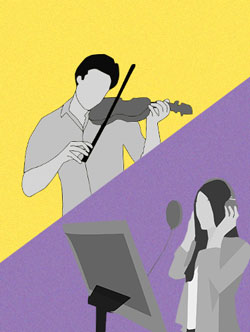By Kelsey Sutton
Adweek, May 20, 2019.
A hiring manager and an expert in nonverbal communication on putting your best foot forward
Your resume rules, your cover letter is flawless and you’ve impressed a hiring manager enough to get invited in to meet with them in person. Time to panic!
Interviews are often the most stressful part of job hunting. It’s usually the first time you’re meeting the person who might become your boss face to face, and you’re sometimes meeting several people back to back and trying to impress and charm them all.
Katie Ramp, director of talent at the advertising agency M/H VCCP, said she notices how candidates carry themselves and views them as clues for how they might interact with clients if she were to hire them.

Getty Images
“One of the things we’re looking for when we interview people is how well you are going to present to clients,” Ramp said. “If you’re not presenting well to people within the agency, how are you going to come across to clients?”
No need to sweat. Patti Wood, a body language expert who has written seven books on the subject and lectures around the country, walked Adweek through some tips on how to perfect the art of the job interview.
Prepare with a friend

Wood, who works with hiring managers and job seekers alike, recommends conducting a few mock interviews with a friend, in person or over a video call, and practicing your handshake, which should be firm and palm to palm with the other person’s hand. Arm yourself with answers to commonly asked questions.
Use the mock interview to practice speaking naturally and conversationally instead of rehearsing the same answers verbatim. Preparation like this will help the interviewee appear more confident and natural, especially if the candidate is leaning forward, listening and remaining engaged with the interviewer over the course of the conversation, Wood said.
“[The interviewer needs] to see, nonverbally, your interest and excitement for that company and that job,” Wood said.
Start strong, end strong

Interviewers regularly make their decision about whether to hire someone within the first 10 seconds of meeting them, Wood said, so it’s crucial to make the first impression count. Ramp said she is particularly mindful of how candidates treat the receptionist or other people in the office, even before the official interview begins.
If you’re waiting in an office lobby, stand up tall and greet the person meeting you with eye contact and a firm handshake before dealing with any of your belongings, especially your phone, which should be safely tucked away and out of your hands. Be prepared to offer a handshake or two at the end of the interview, too. That means keeping your bag or portfolio on your left-hand side so there’s no need to shuffle your belongings around.
“Be extremely engaged from the moment you get on the property,” Wood said. “Don’t wait to turn on. If you are sitting out in the waiting room on the phone, you are giving an impression. If you’re on your phone when they’re coming out to get you, you’re giving an impression.”
Let your genuineness shine

Don’t think you have to be a corporate robot to impress an interviewer. A sense of humor or a genuine conversation about something you’re interested in are welcome at certain points of the interview. It gives you a chance to showcase your personality and make a personal connection, Wood said, and your interviewer will notice when you become particularly animated about those topics.
Ramp said she looks for moments during interviews when candidates’ faces light up.
“It’s OK if they are shy or quiet, but I think … you can tell if there’s something they are passionate about, no matter what that is,” said Ramp, who asks candidates what they are passionate about outside of work during interviews. “We are looking for people who do have this passion for creativity and making and getting involved in something.”
Keep life exciting

Perhaps your resume is out in the world but no one is biting. Maybe you’ve gone through several rounds of interviews and haven’t gotten an offer. It can get discouraging, and Wood said that’s often when her clients sink into a housebound funk, which can inadvertently sabotage the interview process.
“If the only thing that’s stressful or exciting is a job interview, there’s no balance to that,” Wood said. “It puts too much pressure on the job interview.”
To combat the post-graduation blues, Wood recommends finding ways to keep your day-to-day life fresh instead of just filling out job application after job application. Wood recommends “little wild adventurous things,” like visiting lectures, going to museums or even simply switching up your coffee spot.
It’s likely those new activities may come up in a job interview when someone asks to know more about you, Wood said, and those new experiences will shine through in your posture and your facial expressions. Plus, it will show interviewers that you’re not parked in front of a TV or a computer all day.
Kelsey Sutton is a tech reporter at Adweek. She was previously a media reporter at Mic and Politico.












